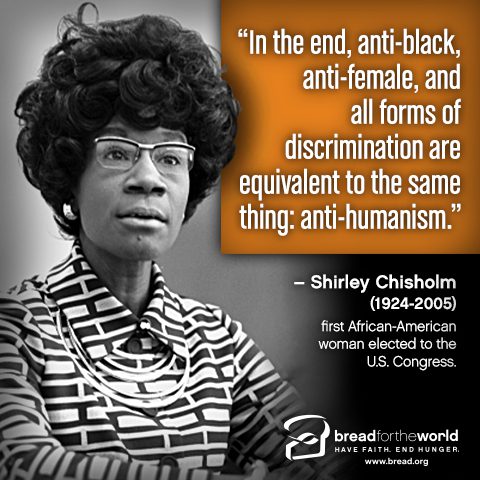By Bread Staff
Today concludes the Bread Blog posts celebrating Women’s History Month. It is fitting that it comes a few days after a Capitol Hill briefing on the 2015 Hunger Report When Women Flourish… We Can End Hunger.
Chisholm’s words are apt considering that discrimination is a significant roadblock to women’s empowerment. Because women are key to ending hunger by 2030, their empowerment is vital to the process.
“There is substantial evidence that educating girls, improving women’s health outcomes, and increasing their incomes pays huge dividends for their children, for their families, for their communities and for their countries, said Asma Lateef, director of Bread for the World Institute, during Friday’s briefing.
The Hunger Report looks at discrimination as a cause of persistent hunger and makes policy and program recommendations in order to empower women both in the United States and around the world. Increasing women’s earning potential by boosting bargaining power, reducing gender inequality in unpaid work, increasing women’s political representation, and eliminating the wage gap between male and female labor directly contributes to ending hunger.
These issues were discussed during the briefing, which was hosted by the offices of U.S. Reps. Bobby Rush (D-IL) and Karen Bass (D-CA), Bread for the World Institute and the African American on the Hill.
Panelists included Margaret Enis Spears, director of the office of markets, partnerships and innovations, U.S. Agency for International Development; Ambassador Amina S. Ali, permanent representative, The African Union Mission to the United States; Shari Berenbach, president and CEO, United States African Development Foundation, and Rev. Dr. Angelique Walker-Smith, associate for National African American Church Engagement at Bread for the World.
The Hunger Report recommends that in order to improve women’s empowerment and end extreme hunger and poverty worldwide, women should have more economic bargaining power. If women had more control of their income and assets, their bargaining power in both the household and the market economy would increase, as well as their ability to feed and provide for themselves and their children.
According to U.N. Food and Agriculture Organization estimates, if women in Africa and elsewhere had the same access to agricultural resources as men, they could grow 20 to 30 percent more food. This could move roughly 150 million people of out hunger and poverty!
To achieve this, the U.S. government must increase its investments in agricultural-development programs like Feed the Future. And it should place a stronger emphasis on programming that supports women smallholder farmers when it implements projects.
For more information on the integral role women play in ending hunger and poverty, make sure to read When Women Flourish… We Can End Hunger and also visit Bread Blog.



